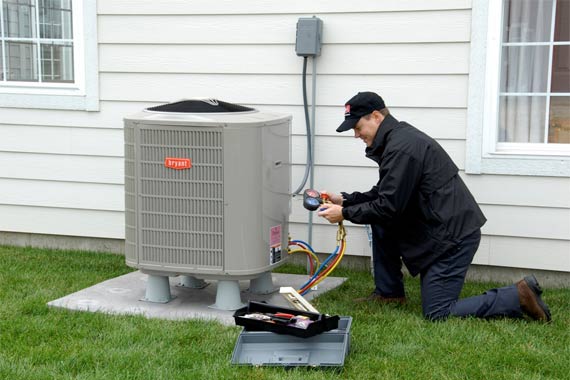Feautured image from: HouseLogic
We all know the popular children’s story of Goldilocks and the three bears. Goldilocks went inside a house in the forest, tasted the porridge on the table and ended up complaining about it being too hot or too cold.
We have no way of knowing the season when Goldilocks frolicked in the forest, or what her lifestyle preferences are, but it is safe to say that she – alongside all the households in the world – would prefer to have the “just right” temperature. Other than food, the right temperature at home is always a preference because it is tantamount to achieving maximum indoor comfort.
Private HVAC companies, Warner Service and Comfort Pro, have compiled and published in their respective websites some HVAC statistics worth mentioning. In the United States alone, 84 percent of households have installed air conditioning units. Statistics show that the number of installed A/C units in the US is far bigger than the numbers of A/C units in all other countries combined. It is more common to find an A/C unit inside an American home, than a dishwasher, garage or even a dining room.
With regard to heating, Comfort Pro says “it’s a safe guess to say, around 1.8-2.0 million furnaces are in U.S. homes today.”
Given these household figures, less than half (only 42 percent) seek the help of HVAC professionals for routine maintenance. No wonder why some A/C units are worn out, years before their average expected lifespan of 20 years.
So, Where Do I Start?
 Ideally, everything starts with the right contractor. In the age of the internet, anybody can claim they are the right one for the job so do not trust online posts of contractors that easily. Sure they may have positive testimonials from old clients, but you need to discern and evaluate them before proceeding with your installations.
Ideally, everything starts with the right contractor. In the age of the internet, anybody can claim they are the right one for the job so do not trust online posts of contractors that easily. Sure they may have positive testimonials from old clients, but you need to discern and evaluate them before proceeding with your installations.
You may also start asking your neighbors for referrals and invite over professionals to discuss your lifestyle and preferences for your HVAC system. With this, you can have a benchmark idea on the costs and timeline for repairs and other services.
Another great idea is to determine what type of HVAC system you need to put in place. Once you are clear on this, it will be easier for you to make the most of the chosen HVAC system within the ideal parameters and minimize the risk of using your heating or cooling system beyond its limits.
Lastly, you may also check out resources from associations such as the Air Conditioning Contractors of America. ACCA is the association of HVAC (heating, ventilation, air conditioning, building performance) contractors – they have a number of resources in their website for homeowners and building administrators which can help you better understand indoor comfort systems.
Knowing Your HVAC Units

Aside from choosing the qualified contractor for the job, it pays to know about the HVAC units installed in your home.
Age
First, know the lifespan of your equipment. Some units last up to 20 years, but it is common to experience problems during the 10th year of usage, or earlier.
Efficiency Rating
If possible choose HVAC units with higher SEER (seasonal energy efficiency ratio), EER (energy efficiency ratio), AFUE (annual fuel utilization efficiency) or HSPF (heating seasonal performance factor) ratings.
Warranty
Read the terms and conditions to know the scope of your unit’s warranty.
Maintenance inspection results
Check with your contractor the results during a routine checkup and consult how to further avoid experiencing the same concerns.
Monitoring Your Units For Safety
There are various checklists available over the internet to make sure you monitor your HVAC system at home. You may do some DIY monitoring for safety.
First off, you might want to consider checking the air filters of your air conditioning units.
Next, you could look into maintaining the area around your A/C units. Make sure trees, shrubs and other plants are at least three feet away from the units. Soil, dirt, snow and dried leaves can cause damage to your units so make sure you clean the surroundings properly.
It’s important to note that ductwork is important in maintaining your air conditioning systems. Do not underestimate the duct work, because most of the time, it’s the cause of uneven temperature and smell.
Lastly, do not block ventilation because your unit will overwork to maintain the temperature levels. Consult with your HVAC about this.
Cost efficiency is a major concern when it comes to installing and operating HVAC systems. Here are some tips to help keep costs down even when your HVAC systems are already in place.
Do not keep your HVAC units in standby mode. Statistics show 75% of the normal household electricity bills come from home electronics in standby mode, including HVAC units.
Invest in the electronic air cleaner. It is more efficient than the regular air filter you would normally throw away after use.
You may also opt for the normal air filter, provided you change them every 2-3 months to ensure the longevity of your A/C units
Smarter technologies are available, using mobile phones, tablets, and smartphones, where you can control heating and air-conditioning in one push of a button.
There are ductless HVAC systems should be on your options as well.
Installation of Heating Ventilation and Air Conditioning (HVAC) units — like furnace, water heater system and air-conditioning — would provide much-needed comfort to your home. However, HVAC units don’t just provide ease. As the Air Conditioning Contractors of America (ACCA) puts it, “HVAC doesn’t just control temperature. It has an impact on the air that you breathe, on moisture and mold growth, the amount of energy that you use and money that you spend, and most importantly, on you and your family’s health.”
HVAC professionals cannot stress enough the importance of routine check-up. HVAC units are complex mechanical systems and it is always advised to leave the maintenance to professionals. This will not only ensure the longevity of your units, but it will also drastically improve energy consumption as well and save tons of money in the future.

